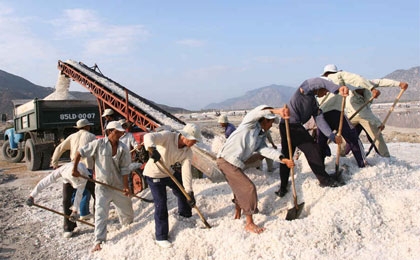Rubbing salt into the wound
 |
| illustration photo |
This is despite the fact that chemical manufacturing firms are crying out for industrial salt and asking for imports.
Le Van Hung, director of Southern Basic Chemical Company, said his company needed 80,0000 industrial salt tonnes for its produce.
Hung added that because of the shortage, his company delayed many projects such as the project to raise its capacity to meet Lam Dongaluminum-bauxitecomplex project.
In June this year, the Ministry of Industry and Trade was not supported by the Ministry of Agriculture and Rural Development (MARD) for the plan to import 50,000 tonnes of industrial salt.
Last year, the two ministries as well local chemical firms and salt firms sat together to discuss domestic salt demand for 2011. At that meeting, domestic salt firms said they could only supply 70,000-75,000 industrial salt in maximum in 2011, far from the estimated domestic demand of more than 260,000 tonnes.
Based on this forecast, the MoIT agreed to grant import quota of around 102,000 tonnes of industrial salt across this year.
Dao Trung Tuyen, general director of Viet Tri Chemical Joint Stock Company - one of the largest chemical firms in Vietnam, said: “We really want to buy industrial salt in the domestic market, the problem is that there is no availability of the material for us.”
The MoIT’s Chemical Department said in a meeting between MoIT and MARD on July 13 that it wanted to know about the actual supply of domestic salt producers before making decision on additional industrial salt import quota. But, no salt firm took part in this meeting.
Under Vietnam’s World Trade Organization commitments, the country is able to maintain an import quota system for several agricultural products including salt, sugar and eggs.
Vietnam has for many years imported industrial salt as local suppliers cannot satisfy both quantity and quality. In 2008, the country for the first time imported edible salt for households.
According to MARD, until 2015 local salt farms can satisfy the domestic demand for both industrial and edible salt.
What the stars mean:
★ Poor ★ ★ Promising ★★★ Good ★★★★ Very good ★★★★★ Exceptional
 Tag:
Tag:
Related Contents
Latest News
More News
- Foreign leaders extend congratulations to Party General Secretary To Lam (January 25, 2026 | 10:01)
- 14th National Party Congress wraps up with success (January 25, 2026 | 09:49)
- Congratulations from VFF Central Committee's int’l partners to 14th National Party Congress (January 25, 2026 | 09:46)
- 14th Party Central Committee unanimously elects To Lam as General Secretary (January 23, 2026 | 16:22)
- Worldwide congratulations underscore confidence in Vietnam’s 14th Party Congress (January 23, 2026 | 09:02)
- Political parties, organisations, int’l friends send congratulations to 14th National Party Congress (January 22, 2026 | 09:33)
- Press release on second working day of 14th National Party Congress (January 22, 2026 | 09:19)
- 14th National Party Congress: Japanese media highlight Vietnam’s growth targets (January 21, 2026 | 09:46)
- 14th National Party Congress: Driving force for Vietnam to continue renewal, innovation, breakthroughs (January 21, 2026 | 09:42)
- Vietnam remains spiritual support for progressive forces: Colombian party leader (January 21, 2026 | 08:00)






















 Mobile Version
Mobile Version